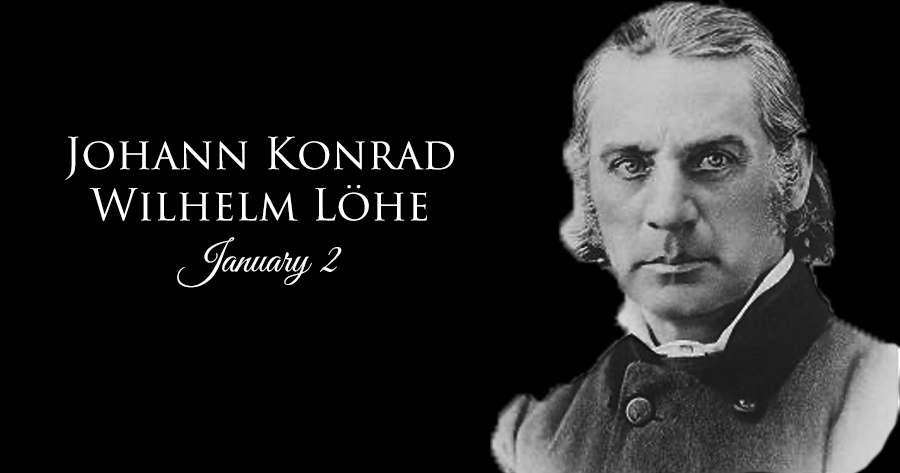
About the Commemoration
Wilhelm Löhe (Loehe), the epitome of a faithful pastor, was a remarkable advocate of confessional, liturgical, devotional, mission-minded Lutheranism. He was born at Fürth, Bavaria, February 21, 1808. His father died in 1816, and the boy seems to have led a lonely childhood. He attended C. L. Roth’s Gymnasium in Nuremberg and in 1826 entered Erlangen University to study theology. There he came under the influence of Christian Krafft, a Reformed professor and preacher, who encouraged him to read deeply in dogmatic theology; and there he also discovered the Lutheran Confessions. Following his work at Erlangen, Löhe went to Berlin for further study. He was ordained July 25,1831, in Ansbach. From 1831 to 1837 Löhe served as vicar and administrator (Pfarrerweser) in a number of places, and in 1837 he became pastor in Neuendettelsau, an insignificant village in Bavaria. His efforts to obtain a city parish failed, and he remained for the rest of his ministry in Neuendettelsau, raising the village to international prominence and giving it lasting fame. Although Löhe was born and reared in the city, he seems to have adapted well to rural life, and, although he never left Germany, he was able from this little parish to influence church life on five continents. In his company, it was observed, “one was impressed as though he was always praying, and even when he spoke of small, outward things, it was as the breath of the Spirit of the kingdom of God.”
Löhe was an ideal parish pastor, who got on well with all classes of people and who in the parish was able to make practical application of his studies, particularly those of the Confessions and of the liturgy. He developed an understanding of the Holy Communion as the center of the life of the congregation from which flowed liturgical renewal and social service. He combined a high view of the ministry, which he viewed as not dependent on the congregation’s call but as transmitted from Christ himself through ordination, with an emphasis on the importance of the role of the laity in worship and in missionary activity at home and abroad.
Löhe’s missionary interest is seen in his pastoral concern, beginning in 1841, for Lutherans who emigrated to North America. He solicited funds through periodicals, and he sent books and other necessary commodities to Lutheran communities. He was instrumental in sending “emergency pastors” to North America to serve the settlers and to convert the native peoples. Löhe’s emissaries assisted in the founding of the Synod of Ohio (although he withdrew support in 1845 because of the synod’s differences over theology and the use of English.) With congregations established by C. F. W. Walther, Löhe’s pastors formed the Missouri Synod at Fort Wayne, Indiana, in 1846. Löhe wrote the spiritual and secular regulations for a series of German colonies that w’ere being established in Michigan—Frankenmuth, Frankenlust, Frankentrost, Frankenhilf. In 1853 Löhe’s pastors moved into Iowa and in the following year, joined by others from Neuendettelsau, established the Evangelical Lutheran Synod of Iowa and Other States. Moreover, his Neuendettelsau Foreign Mission Society sent pastors not only to North America but also to Brazil, the Ukraine, Australia, and New Guinea.
Löhe’s interest was not only in missions. In 1849 he founded the deaconess motherhouse in Neudettelsau, which became the center of social and educational service in schools, hospitals, and allied agencies. He also struggled with the territorial church in Bavaria to give it a clear confessional basis. His relations with the church were strained for several years between 1848 and 1852, but at length the conflict was resolved. He died January 2, 1872, at the age of sixty-three. The chapel at Wartburg Seminary in Dubuque, Iowa, is dedicated to his memory.
Excerpts from New Book of Festivals & Commemorations: A Proposed Common Calendar of Saints by Philip H. Pfatteicher, copyright, 2008 by Fortress Press, an imprint of Augsburg Fortress.
See also: Johann Konrad Wilhelm Löhe
Reading
From a statement by Wilhelm Löhe
What do I want? I want to serve. Whom do I want to serve? The Lord in the person of his poor suffering children. And what is my reward? I serve neither for reward nor thanks, but out of gratitude and love; my reward is that I am permitted to serve. And if I perish in doing so? If I perish, I perish, said Esther, who, after all, did not know him who for love of me perished and who will not let me perish. And if I grow old in his service? Then my heart shall flourish like the palm tree, and the Lord will satisfy me with grace and mercy. Therefore, without anxiety I walk in peace.
Wilhelm Löhe, quoted in Minister’s Prayer Book, ed. John W. Doberstein (Philadelphia: Fortress Press, 1986), 218; rev. PHP.
Propers
Everlasting, gracious heavenly Father, you have given to your church the holy ministry of Word and Sacrament: Grant that the pastors of your church, following the example of Wilhelm Löhe, may fearlessly proclaim your word against every error, false doctrine, and abuse; and may so minister your divine mysteries in all their purity and fullness, that your people may be strengthened to serve those in need wherever they may be, for the sake of your Son, Jesus Christ our Lord; who lives and reigns with you and the Holy Spirit, one God, now and forever.
PHP, adapted from a prayer by Löhe
Readings: Jeremiah 1:4-10; Psalm 46; 1 Corinthians 3:11-23; Mark 10:35-45
Hymn of the Day: “Lord, whose love through humble service” (LBW 423, LSB 848, ELW 712, H82 610); “O Son of God, in co-eternal might” (CSB 529), by Löhe, trans. Harriet Reynolds Krauth Spaeth with a tune by her husband, Adolph Spaeth; “Wide open stand the gates” (LSB 639), by Löhe
Prayers: For truth; For doctrinal purity and clarity; For missionary concern at home and abroad; For a deeper understanding of the Holy Communion; For parish pastors.
Preface: Christmas/Incarnation
Color: White
